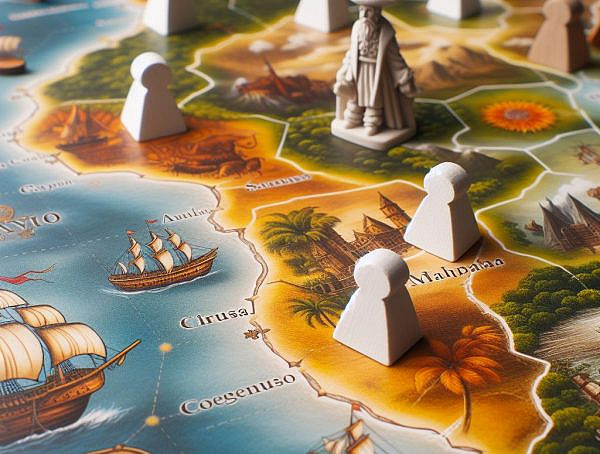Goa and Navegador depict colonialist empire-building without violence
The lack of violence in games about historical colonialism is problematic, and Nancy Foasberg illustrates the phenomenon in her article “The Problematic Pleasures of Productivity and Efficiency in Goa and Navegador”, published in Analog Game Studies. The author takes a closer look at two board games about the building of the Portuguese empire in the colonialist era. Goa (2009) and Navegador (2010) deploy economical mechanics that imply violent expansions, but still completely ignore the existence of indigenous people.
Terra nullius refers to areas that are empty of people and free for exploitation, and the colonized countries are depicted like that in many European board games. Economies are built from scratch into places where no economy existed before, and previous ownership of land is ignored. The competition is purely between the players, and the victims of colonization are invisible.
Goa. (Boardgamedialog.com)
In Goa, the players are Portuguese merchants that ship resources from India back to their empire. While competing for profits and glory, the players buy Indian land from Portuguese owners, and the rather difficult task of running a profitable business only requires careful planning from the player. The actual workforce is forgotten, and the setting suggests that only the colonizers know how to use the land effectively.
Navegador has the players send ships from Portugal to colonize other countries. Even though the game art depicts native peoples in certain places, they are not mechanically included in the game, and almost every area is terra nullius. The players ship resources such as gold and sugar, which were historically closely tied to slavery. However, Navegador shows empire-building as an easy, profitable and non-violent process.
Game designers make decisions about what kind of themes to abstract in their games, and the effect depends on the context. Some abstraction can leave room for personal interpretation, but the omission of slavery and indigenous people in games about colonialist economies carelessly celebrates our violent past.
Authors: Nancy Foasberg
Published in: Analog Game Studies, January 11, 2016
Original article: http://analoggamestudies.org/2016/01/the-problematic-pleasures-of-productivity-and-efficiency-in-goa-and-navegador/
Featured image: Metagames.co.uk. http://blog.metagames.co.uk/wp-content/uploads/Navegador-game.jpg
You might also like
More from Game Research Highlights
How do you want to do this? – A look into the therapeutic uses of role-playing games
Can playing RPGs contribute positively to your wellbeing? A recent study aims to find out how RPGs are being used …
Eldritch horrors and tentacles – Defining what “Lovecraftian” is in games
H.P. Lovecrafts legacy lives today in the shared world of Cthulhu Mythos and its iconic monsters. Prema Arasu defines the …
Are Souls Games the Contemporary Myths?
Dom Ford’s Approaching FromSoftware’s Souls Games as Myth reveals the Souls series as a modern mythology where gods fall, desires …
















